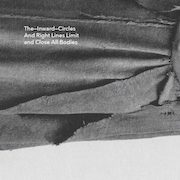Despite the often melancholic nature of his compositions, Richard Skelton’s solo work under his own name or as A Broken Consort, or as part of the duo *AR with Autumn Richardson, has always had an open, outward-looking quality. It translated the windswept landscapes of northern England or the Irish coast into musical forms, Skelton’s bowed string drones becoming echoes of the land and the sea, as if he were reaching out to describe them to the listener. His most recent project, however, is centred on more introverted matters. As its name suggests, The Inward Circles sees Skelton burrowing into the ground and his own psyche, revealing more sombre realities as he does so.
Like its predecessor, 2015’s extraordinary Belated Movements for an Unsanctioned Exhumation August 1st 1984, And Right Lines Limit and Close All Bodies takes as its thematic starting point a long-buried cadaver, this time found in Cumbria, but it’s not an archeological reconstruction in sound à la Chris Watson on In St Cuthbert’s Time. Instead, Skelton uses the Cumbrian man as an embarkation point to delve into the frightening effect that the passage of time has on the material world. If one thinks of a decomposing cadaver, such degradation happens generally away from the prying eyes of humankind, in tombs, bogs or pits, so there is intrinsically an aspect to And Right Lines that evolves at an evocative, imaginary level, the sombre strokes of Skelton’s synthesizers and transmogrified sound effects existing in a realm of grim introspection and lightless imagination.
As such, on the surface Richard Skelton’s musical language has an earthy quality to reflect the language that surrounds the album. ‘Lye not in Fear’, as a track title, evokes the last rites, the caustic chemical used by many a sinister ender of lives to dispose of unwanted evidence reimagined as an agent of passage from life into the earth that sustains us all. It’s a dark and dank metaphor, and the drifting synth lines, distorted vocal sweeps and murky string drones that have been manipulated beyond all recognition serve to drag the listener downwards into the funereal pit. Anxious sequencer patterns maintain a certain rhythmic pulse as gristly noises flutter back and forth, heralding And Right Lines as Richard Skelton’s most unsettled – and most unsettling – album to date. Where even as The Inward Circles, but especially under his own name, Skelton would previously allow notes to linger like the cries of birds echoing across a valley, now he engages in a sort of folk-drone sensory overload, the massed tones aggregating to form sepulchral excavations as deep and unfriendly as a charnel pit. Elsewhere, ‘In an Hydropicall Body’ surges fitfully over ten minutes of mutated drone (could be an organ, could be a mutant string tone) surrounded by ever-building shimmering synth textures and an undercurrent of Throbbing Gristle-like mulch. Once again the imagery of land and nature seems forefront in the piece’s pyschogeography, but this time it’s dense, foreboding and altogether unwholesome.
By subjecting his panoply of string instruments (cello, bouzouki, viola) to so many degenerative effects, Skelton is using them as a metaphor for the degradation of the human body through the adverse influence of time and the natural world. Crucial here is that the instruments be acoustic: even if the methods of altering and disintegrating them are digital, the result is an organic transformation of familiar sounds. But within such faltering depths, the human essence still finds room to transcend its earthly -and earthy- demise. ‘The Soul Subsisting’ features an elegiac drone throughout that builds heavenwards, as if said soul was not so much subsisting as persisting. The ambiguous combination of the track’s grim title and the music’s blissful textures creates a mysterious atmosphere. Although he is a singular, even unique, artist in the avant-folk and drone circles in the UK, Richard Skelton cannot be completely divorced from the tradition of dark and light that has dominated these islands for aeons, especially in the wake of recent (dark) folk revivals. For all the darkness and decay, there is a human tradition that, no matter how deeply buried, endures.
On ‘Nitre of the Earth’, brittle surges of distorted string noise are counterpointed by tender swells that try to claw back warmth from the depths of cold, wintery disintegration. ‘Necks was a Proper Figure’ is even more hesitant and wistful, its textural overload imbued with the kind of intense melancholy than so beautifully defined Skelton albums like Landings. Even as he unflinchingly and resolutely disassembles the means he uses to make his music, and buries them six feet under, Richard Skelton’s own heart breaks through the mud to imbue music that could have been coldly morose (like so many dark ambient releases) with an emotional beauty that lingers well after the disc has stopped spinning. This is perhaps most potently evoked by the digital-only album that accompanies And Right Lines, Scaleby. Its tracks are in general shorter, but take in a range of moods more than textures or themes. As the string samples vacillate between dark tonalities and ghostly shimmers, a new idiom emerges, one that uses the languages of death and decay to better celebrate the living.


